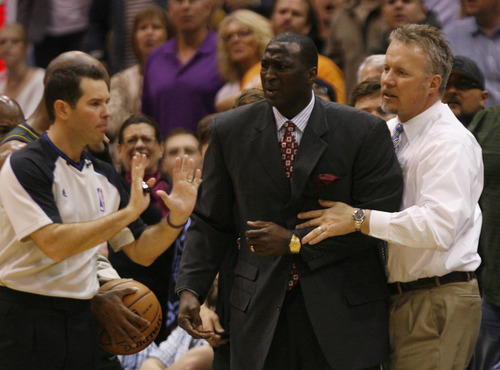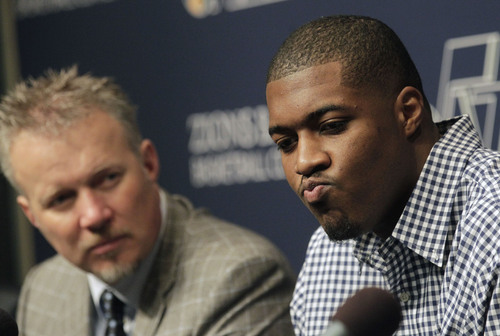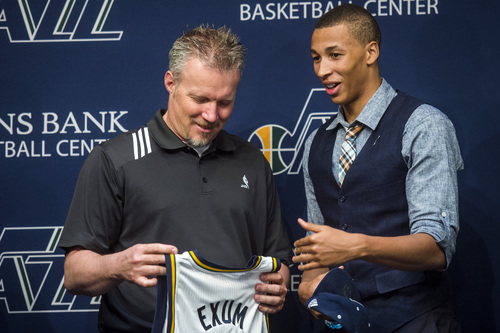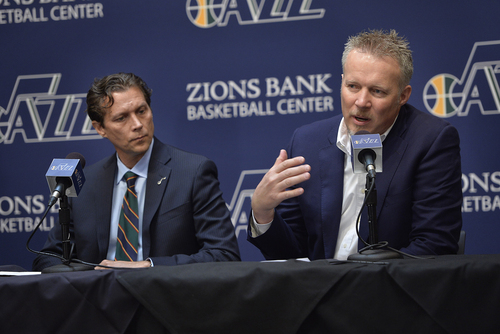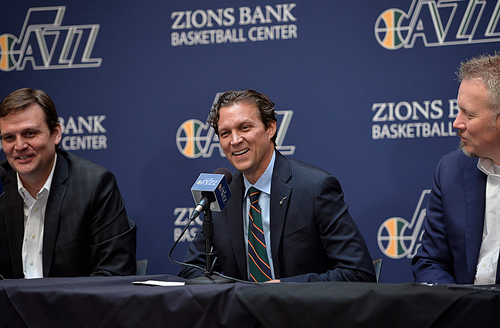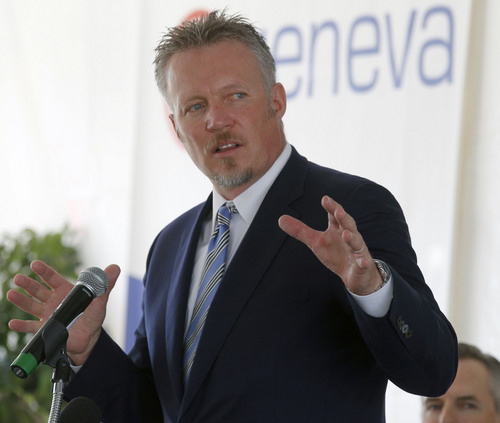This is an archived article that was published on sltrib.com in 2014, and information in the article may be outdated. It is provided only for personal research purposes and may not be reprinted.
Greg Miller recently came into the studios of 1280 AM/97.5 FM The Zone at our invitation and sat down to answer questions and talk about, among other topics, his influence and experience as owner of the Jazz, what he expects from this year's team, what he expects over the long haul, what effect he can have on the NBA.
His responses were relaxed and thorough and of interest to most Jazz fans.
Asked about a timetable for the team's ascent from the nadir of 25 wins last season to the lofty reaches of true contention, he said:
"I wouldn't want to quantify it from a time standpoint, but what I would say is, I can assure everybody who has an interest in the Jazz that our family is doing everything we can do at every turn to help the Jazz get better as quickly as possible. It's a process. If you think about it, the NBA is comprised of roughly 450 athletes out of the seven billion people in the world. These are the ones who the basketball experts have chosen as the best basketball players in the world. You have 30 owners or ownership groups that have huge investments in these teams, huge investments in the arenas. Every one is competitive by nature. It's an extremely competitive environment.
"There are several ways you can get a championship. One is to just do what Miami did and go out and hire a bunch of free agents and, more or less, buy a championship. I don't want to be unfair to them because I have a lot of respect for the Heat and the Arison family. But our style is different. We're more organic. We're not looking for a quick fix. We're looking for long-term success.
"That's why we've chosen the route that we have — recruit young guys who are good citizens who aren't troublemakers, they'll follow direction, that can work well together, that represent the franchise well in the community and then we just nurture them. And build and invest and hope dividends come. That process takes longer, but I think it's more durable and it's more rewarding, if and when the payday comes. And I'm confident that it will."
Asked about the prospects for the immediate future, he said:
"I think we're very young, we're very fast, we're very athletic, and I think — properly coached — these young guys can develop into something very, very special. That's what I expect."
Asked why he is excited about the coming season, he said:
"There's a number of reasons, and I should probably preface my remarks by saying that I'm thankful for the years that Tyrone [Corbin] gave us. I may have never met a finer gentleman in my life. He's just a genuinely good guy. And there's a big part of me that's sad to see him go — on a personal level. He gave us everything he had.
"Having said that, I'm excited for Quin Snyder to be here. The main thing that's apparent to me with Quin is that he is one who will lay out what he expects and he will hold the guys accountable to execute his game plan. And if he's not liking what he sees, he'll stop and he'll tell the guys … essentially, he'll say, 'We can get through this in an hour or we can take all day.' That level of accountability is one of the reasons I'm excited. If our players are held accountable to do what they've been coached to do, then I think you'll see us perform at a level that we haven't for the last few years. And who knows where that can lead? It could lead to a lot of wins."
Asked about the recent troubles in certain cases plaguing the NFL regarding domestic violence and child abuse, and the fact that the NBA isn't immune to such instances, Miller said he would let Adam Silver speak for the league. But he added that, as far as the Jazz go, there would be little tolerance for such behavior. And he was strong on the matter, saying:
"We have a code of conduct," and, "It's not right to hurt people," and, "There's no place to hurt women and children."
Asked about his growing leadership role at the NBA level, after six years at the helm of the Jazz, a role that now includes seats on a couple of league committees, he said he looked forward to greater influence — in time:
"It's been a great learning experience for me. … I do a lot more listening than I do speaking. … I've still got to earn my stripes among the owners. But we're in this for the long haul, as a family. And we want to do what we can to protect the interests of small markets. To that end, my hope is to be involved to whatever level the NBA will have me."
Asked what impressed him enough to hire Snyder as the Jazz's new coach after Corbin was let go, Miller said it was what Snyder said about defense:
"He said, 'Everything hinges off the defense … if a team plays defense well together, it means they know how to trust each other, and when you have that level of trust, you can do just about anything.'"
Asked about the way he runs the Jazz and the LHM Group of Companies versus the way his father, Larry Miller, ran them, Miller said:
"We are very different and I think that's good in some ways, and in some ways I feel like I should be more like him. My dad was a self-made guy, a classic entrepreneur. And I tell people, I really think in his heart, if he would have been able to do things like he wanted, he would have fixed every car that came through his service department, he would have scanned every Jazz ticket, he would have torn every ticket at our theaters, he would have touched everything. And our organization got to the point long before he died where that entrepreneurial hands-on [approach] actually became counterproductive.
"I was witness to that. I saw that we could do more if we let the talented people in our organization have more authority and autonomy to exercise their ideas and develop their talents and abilities. I always felt that if I ever had a chance to make that decision that would be one of the first things I did. I restructured the company since I became CEO. … It's fostered growth throughout the organization.
"Another difference is that, as we all know, my dad was a very passionate guy, and he wore his emotions on his sleeve. I think there's a time and a place for that. But I saw the remorse that he felt that night he got into it with the Denver fan and had him in a headlock. He regretted that so deeply, it was such a public event. There was no hiding from it. And then there was the time he came over and yelled at Jerry [Sloan] for playing Karl Malone when he was having a bad night. Other times, he would go in and throw furniture, metaphorically and maybe literally, in the locker room.
"Every time something like that happened, it was followed by a measure of remorse. I just decided I wasn't going to do those things. … I've worked hard not to do anything to embarrass the organization or the family. And I try really hard to keep my emotions in check. A lot of times people misinterpret that as disinterest or that I'm not as passionate as my dad. I beg to differ. I'm every bit as passionate."
Asked about his responsibility to run the Jazz and the 10,000-employee LHM Group successfully, Miller said he took that stewardship to heart and he related a story about the time, shortly before Larry Miller's passing, when the iconic company leader phoned from his hospital bed into a board meeting at company headquarters which Greg was conducting, and he wrapped up his feelings in two short sentences:
"He said, 'I trust you guys with my life's work. Don't screw it up.'"
GORDON MONSON hosts "The Big Show" with Spence Checketts weekdays from 3-7 p.m. on 97.5 FM/1280 and 960 AM The Zone. Twitter: @GordonMonson.


